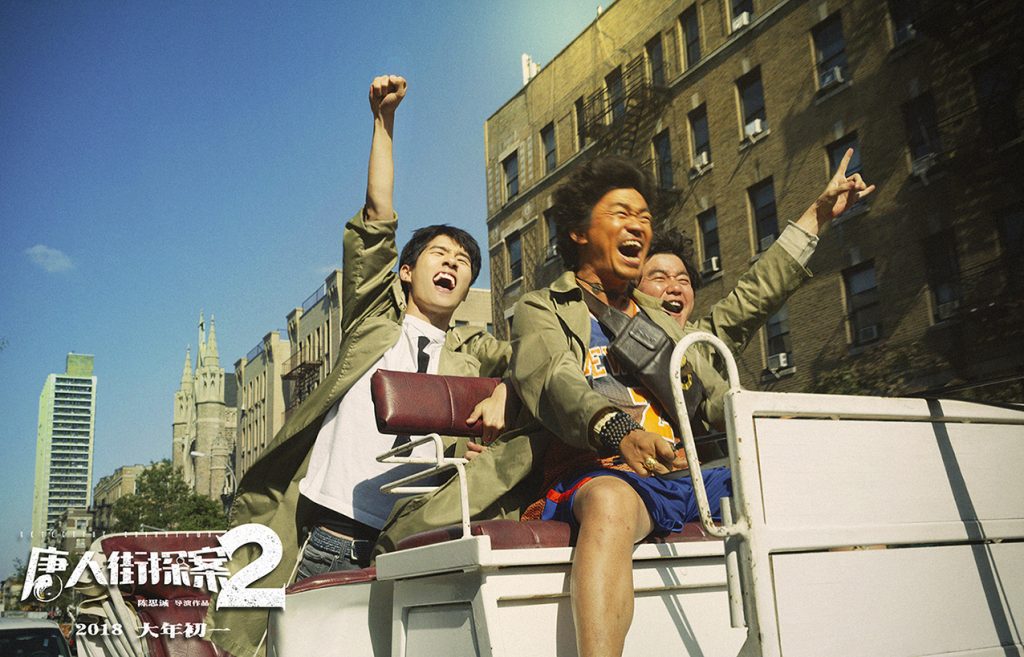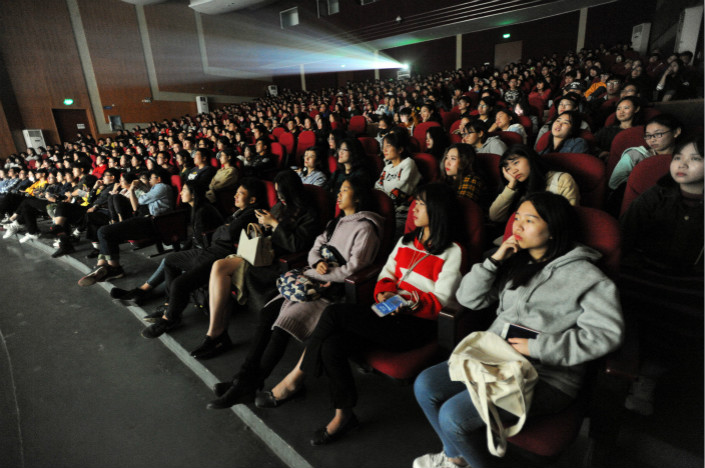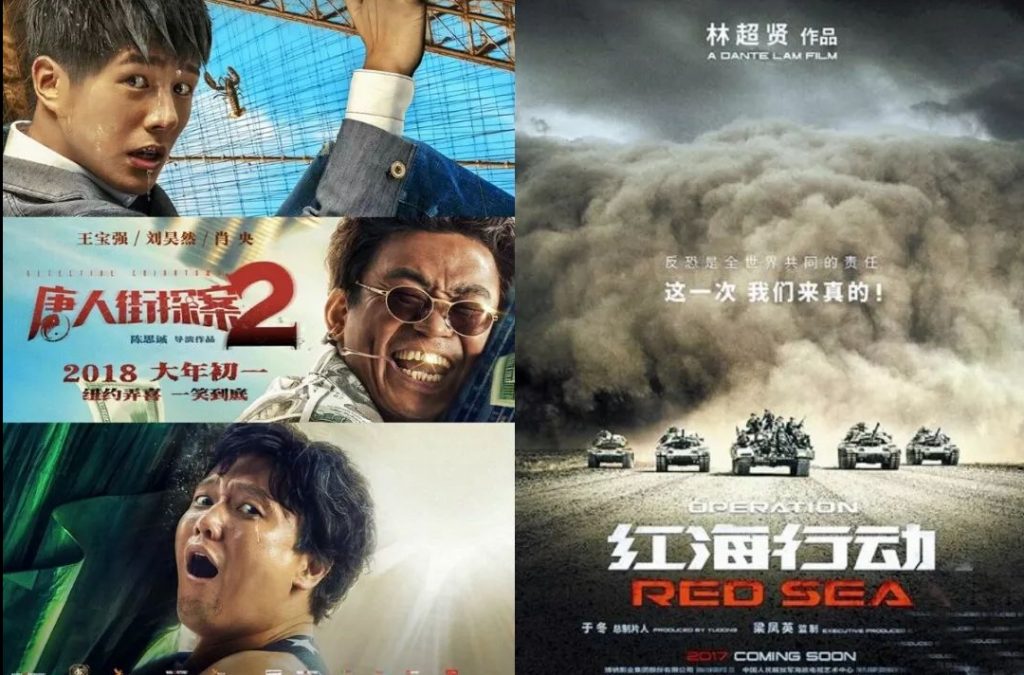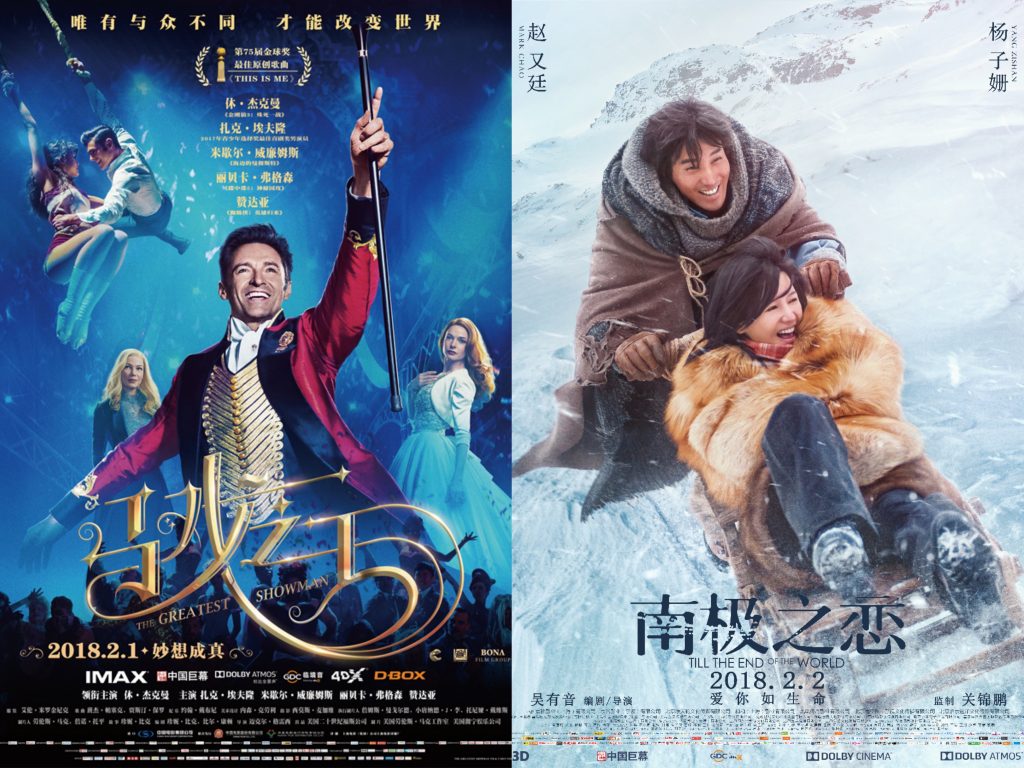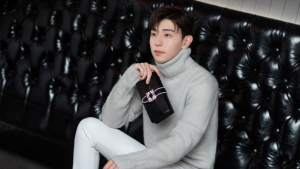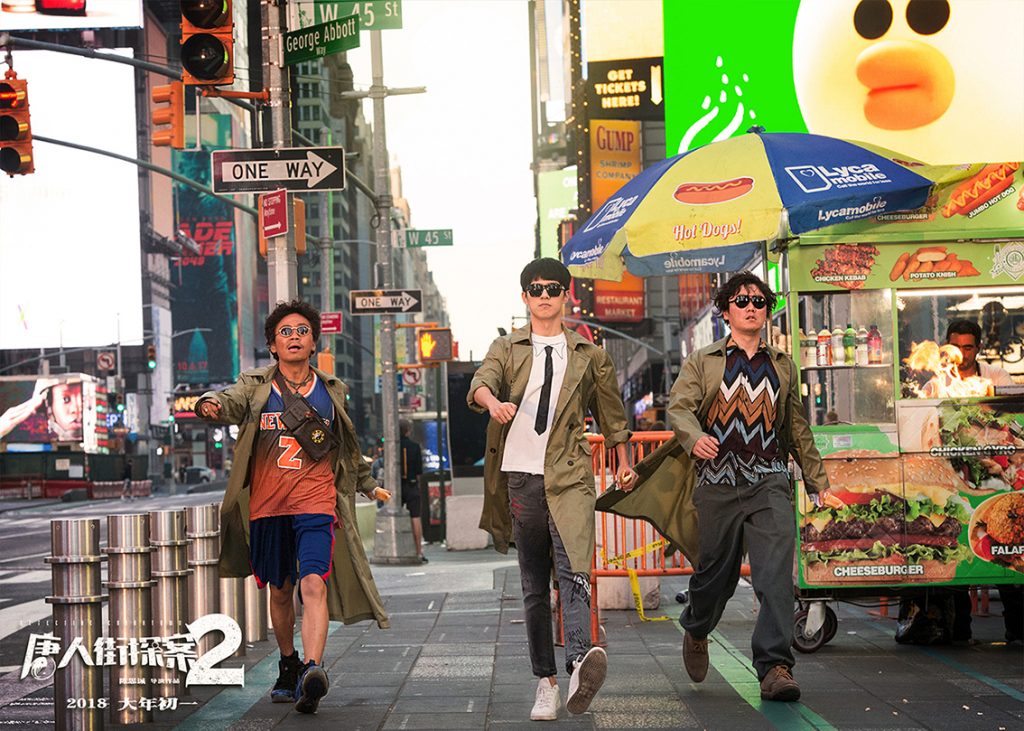
Writer-director Chen Sicheng shot Detective Chinatown 2 in New York City for 40 days over the fall. It was the first Chinese-language production in the U.S. to use union crews. Starring Wang Baoqiang and Liu Haoran, it is a sequel to 2015’s hit action-comedy. Warner Bros. released it today on 115 U.S. theatre screens.
Toward the end of the shoot, working in the rain on location at the Brooklyn Navy Yard, Chen and producer Shawn Yue sat down in a production trailer to talk.
It’s raining now, which you didn’t plan for. How has the weather affected the shoot?
Because we are on a very limited budget, there’s no other options but to keep going. We shot last week on Madison Avenue, a small sequence, but we shot in the rain, we shot in the sun, we shot in the smog.
If this were China, that would never happen. For continuity, the scene always has to be either shining or rainy. So we have to figure out a way to fix it in post.
Shawn Yue said you couldn’t get to two shots this afternoon.
That’s already fixed. Before the rain started, I was missing two shots. But after the rain stopped, we used a different angle that wasn’t covered before, so we got what we needed.
So what’s the most difficult part about shooting in New York City?
There are three major points about the difficulty of shooting in New York City. One, expensive. Two, expensive. Three, expensive. Very expensive.
This is a Chinese-language film, and Chinese films are hard to distribute globally. If this were an English-language film made at an American studio, we could put a lot more money into the budget. But since it’s a Chinese-language film, there is a maximum amount you’re allowed to spend. But we chose to shoot in New York City anyway, despite the limitations.
But why pick New York City in the first place?
[Shawn Yue, laughing:] He wants to be tortured by the city.
When I was shooting Detective Chinatown, everyone who heard about it said, “Chinatown? That must be in New York City.” The Chinatown in New York is actually the most famous Chinatown all over the world. But we shot the first one in Thailand.
I’m determined to make Detective Chinatown into a big franchise. There will be part one, two, three and four. To achieve that, part two is actually more important than part one. If part two fails, there will be no franchise.
The first one in Thailand worked pretty well, but in order to raise expectations for the whole franchise, part two has to be way better than part one. That’s why I’ve come to the center of the universe, to New York, so everyone will feel this is an upgrade from Detective one.
What did shooting here add to the film?
No other place can compete with New York City. You’ve got super good locations here, plus all the locations I’ve found that people in China haven’t seen yet.
Number two, the infrastructure here is very good. Especially background actors, they’re the best I’ve ever used in my career. You put them in the background and you don’t have to pay special attention to them—they are the characters you want them to be. Plus, they’re very good actors.
New York is a melting, pot, very diversified, people from different races, different national backgrounds, different countries and cultures. You can’t fake that. We have access to the background actor who actually is from the background he is acting.
New York has a very bright side, a super-fancy, expensive, high-end side, and also a ghetto side, areas that make you feel unsafe. So we’ve been covering the fancy parts, but we also go to the bowels of the city, the deepest tunnels of the subway and train systems. We also go to what people normally call the unsafe areas to shoot.
I also wrote the script, and the way I write is to experience the city beforehand. A lot of the stories in the script came from when I visited for several weeks. So in the end we experience the diversity of New York, the fancy and the not-so-fancy; the safe part, the feel-good part, and also the dangerous part.
What do people in China think of New York?
Most have a very typical tourist perspective, thinking about Times Square, Central Park, Grand Central Station. More like a superficial concept of New York City. They don’t really know, they haven’t been given the opportunity to really access the diversity here.
Oh, and they think of Donald Trump.
The old stereotype from Hong Kong filmmakers made New York a place of gangs, fighting. Modern-day Chinese don’t see New York as a dangerous city. They probably see Paris as more dangerous.
So what was it like to shoot in New York’s Chinatown?
When I was shooting Detective Chinatown 1 in Thailand, the Chinatown there is just like Bangkok everywhere. It’s just an area of the city with a little bit of Chinese flavor.
Chinatown here looks like old China, it’s not like modern-day China. Chinatown is like old China in old times. But the thing about New York is that each area is unique. Harlem, Spanish Harlem, one has an African-American way of living, the other is more Hispanic. They’re not trying to influence each other.
That’s the character of New York City, you are allowed to be who you want to be, people don’t interfere with your life.
I’ll tell you, Flushing was the real shock. I go to Chinatown, okay, it’s Chinatown, it’s got a flavor I know. But Flushing—that feels like home, like modern-day China. It feels like a Chinese colony outside of China.
Can you talk about your career? You’ve been an actor, a writer, and now director. How did you get to this position?
That’s a question I would like to know the answer to. Because if I knew, I might be able do these interviews.
Listen, I think you first of all have to be true to yourself. You have to read a lot. You have to see a lot of movies, talk to other directors to get to know their films. But it’s difficult to describe my style, how I direct. It’s like you take all the information, all the visuals to create a style. But then you have to be like a child. You have to be true to yourself, you have to let everything go, let the inner “you” guide you.
How do you balance technical details with getting good performances from actors?
Number one, even before you start shooting, you need an impulse, a very strong impulse, “I want to tell this story.” Then you play with scale, the thin line between enough and too much. Like yesterday, we were working with an actress who’s a good comedienne. She can act. But she’s too exaggerated, she’s doing too much, so you have to tell her, “Hold it back a little bit.”
Then you have to do a lot of takes, to let the actor and the DP know that we are getting close to that thin line of enough and not too much.
Do you let your actors improvise?
Occasionally. I have a background as an actor, so I know how to communicate with the cast. We don’t really have time to try out things. What’s important is the rhythm, you have to keep everybody at the same pace, and find the right rhythm for the film as a whole. Some directors can’t keep that rhythm steady.
So how do you do that?
I don’t know, maybe it’s a gift. Is it taste? Aesthetics? Usually we are working too hard to stop and think about it.
Have you been editing as you go along?
We tried that, but there’s so much pressure, you just can’t keep up.
When you do edit, does your vision of the movie evolve?
I don’t usually accumulate a lot of footage. I don’t try a lot of takes. I’m more like a “cutting in the camera” kind of guy. Especially this time. We are on a tight schedule. My friend put it this way: “Forty days? Unbelievable.”
You’re a member of the DGA [Directors Guild of America]. Will that play a role in your future projects?
I’m not too eager to become what people call an “international” director. I’m more focused on the Chinese market. It’s good to use DGA standards in my own work, but I want to keep making Chinese films for the Chinese market. Because that market is big, and it’s growing very fast. The DGA has a lot of good directors to serve America. China needs good directors to serve the Chinese.
Asian films can reach the same technical and artistic levels as Hollywood films. Can you use your position to build a broader base of acceptance for Chinese-language films throughout the world?
That’s one of my goals, to expand the Chinese film audience globally, to get more people from the around the world to appreciate Chinese film.
Once upon a time, the Hong Kong film industry made a lot of films that were loved by the world. Bruce Lee, Jackie Chan, Stephen Chow, Chow Yun-fat. But films from mainland China have never been that popular. They’ve never had a golden age, a global acceptance.
How will that happen?
A lot of Chinese comedies are very language-based, one person telling a joke to another so the audience will laugh. I want to try something else. I want the comedy to appear naturally in the storytelling, instead of relying heavily on language. If your movie’s heavily language-oriented, the people who don’t speak Chinese will never be able to understand it. But if you imbue the comedy into the story, make it naturally part of the storytelling, more people will be able to appreciate that.
–This interview originally appeared on Film Journal.


